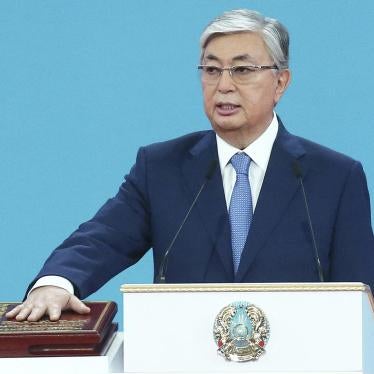(Almaty) – Almaty city authorities’ denial of a permit for a women’s rights march on March 8, 2022, demonstrates the authorities’ indifference to women’s rights, including a serious domestic violence problem, Human Rights Watch said today.
On November 16, 2021, three Kazakh activists, acting on behalf of five feminist groups and activists – KazFem, Feminita, FemPoint, Svet, and FemAgora – requested permission to hold a peaceful march and rally in Almaty on March 8, 2022. The Almaty city administration, in written responses, denied the requests on November 26, citing a conflict with "cultural and entertainment events" and “repair and installation works” allegedly scheduled on that day at the exact same location and time. The activists plan to appeal.
"Kazakhstan’s authorities should be supporting efforts by feminists and women rights activists to improve protection against gender-based violence and for women’s rights more broadly, not denying them the right to protest peacefully,” said Vika Kim, assistant Central Asia researcher at Human Rights Watch. "Women in Kazakhstan are demanding gender equality and better protection and support, calls to be heeded, not hindered.”
Kazakh authorities should respect the right to peaceful assembly and grant permission for the next years’ International Women’s Day event at which women’s rights activists intend to protest gender-based violence and express their demands for equality.
Domestic violence is a very serious problem in Kazakhstan. Hundreds of women annually flee abusive partners, husbands, or other family members and seek help and refuge at the limited number of crisis centers and shelters throughout the country, some operated by the government and others by nongovernmental groups.
The government’s weak response to family abuse has left women with little realistic or meaningful recourse to justice. Police and judges fail to respond adequately to allegations of domestic violence and on the rare occasions when cases go to court, the penalties for abusers are inadequate. A lack of professionally trained social workers, psychologists, and lawyers is also a key barrier to securing protection, Human Rights Watch said.
In response to the request for a March 2022 march, one of the activists told Human Rights Watch, Almaty city officials met with the event organizers on November 24, and strongly advised them to “revise their plans [to hold a procession]” citing the “epidemiological situation” in Almaty. The officials asked the organizers to withdraw their application for the march. The activists refused and told officials that they would insist on their right to hold the march.
Despite claims by Kazakhstan’s leadership that a new law adopted in May 2020 reforms Kazakh’s legal framework on peaceful assembly, it falls far short of international standards. The authorities routinely deny permission to hold peaceful protests, forcibly disperse demonstrations, and fine or detain peaceful protesters. During 2021, the police have increasingly used the controversial crowd control tactic known as kettling – surrounding and confining protestors in small areas – to detain groups on the street for hours on end.
In March, Almaty had its first authorized international women’s day march, with hundreds of peaceful protestors calling for better protection for women’s rights, for gender equality, and criminalization of domestic violence.
Women’s rights are a key human rights issue in Kazakhstan. President Kassym Jomart Tokayev has repeatedly publicly acknowledged the importance of eliminating discrimination against women and the need to boost women’s rights. And while there have been some positive developments in recent months, such as the October abolition of the list of prohibited occupations for women, other longstanding, pressing women’s rights issues remain unaddressed.
In January, legislators suspended review of a draft domestic violence law to strengthen existing protections, and since then, have failed to propose any alternative legislative initiatives to tackle family abuse effectively.
Human Rights Watch has repeatedly called for Kazakhstan to explicitly criminalize domestic violence and for greater accountability for abusers, as well as better support and services for survivors of domestic violence, including in rural areas.
Kazakhstan’s international partners should urge the Kazakh government to criminalize domestic violence as a standalone offense. They should also call on authorities to uphold freedom of assembly for women’s rights groups, including by granting them permission to hold a peaceful International Women’s Day march and rally in 2022.
“The Kazakh government’s empty reform promises don’t protect women from abuse,” Kim said. “Kazakhstan authorities need to take meaningful steps to protect women and their rights, including by criminalizing domestic violence, and to drop any pretext to deny groups their right to peacefully protest on March 8.”








